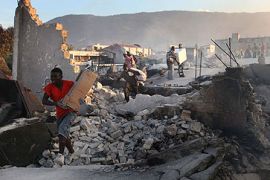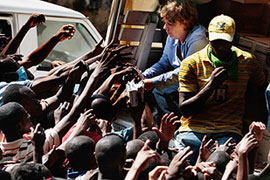Aftershock rocks quake-hit Haiti
Tremor causes fresh panic but rescues and medical aid raise hopes in devastated capital.

 |
| Tens of thousands of people are still living in tent cities in Haiti [AFP] |
A powerful aftershock has hit Haiti eight days after an earthquake devastated the Caribbean country, complicating relief efforts already fraught with difficulty.
There were no immediate reports of more casualties from Wednesday’s temblor, first estimated at 6.1 magnitude then revised to 5.9, according to the US geological survey, but emergency workers said it disrupted rescue efforts and further destabilised many buildings.
Keep reading
list of 4 itemsTurtles swimming to extinction in Malaysia as male hatchlings feel heat
Could shipping containers be the answer to Ghana’s housing crisis?
Thousands protest against over-tourism in Spain’s Canary Islands
The aftershock, which struck at 6:03am [11:03 GMT] about 56km northwest of the capital of Port-au-Prince, was one of the most powerful of some 40 tremors that have shaken the country since last week’s 7.0 magnitude quake.
Panic in the streets
It caused terror and panic in the streets of Port-au-Prince as thousands continued to struggle to find food and water, Al Jazeera’s Zeina Khodr, reporting from the capital, said.
| special report | |
|
“The minute the earth shook, everyone started to scream. They were praying and singing religious songs. People are still very traumatised here,” she said.
Al Jazeera’s Teresa Bo, reporting from Petit Goave, a coastal Haitian town, said many of the buildings that were already damaged by the earthquake collapsed in the aftershock.
“People were telling us how afraid they were. They were completely terrified,” our correspondent said.
Wednesday’s aftershock came against a backdrop of growing frustration among residents over the slow pace of aid distribution.
Al Jazeera’s Tony Birtley, reporting from Port-au-Prince on Wednesday, said: “Aid is still not coming through and the hours are passing. And since the aftershock, camps have really been filling up.
“The people here don’t trust anything anymore and the future is so unclear. They need food, they need medical supplies and they need it quickly.”
Lt General Ken Keen, the commander of the US joint task force in Haiti, told Al Jazeera: “[We] have delivered 1,300,000 bottles of water, over 700,000 meals and over 21,000 pounds of medical supplies.
“Supplies are flowing, they’re getting out, not to everyone, but we’re making progress each day.”
The UN World Food Programme says it has provided 200,000 people with rations for seven days, but the UN says three million to 3.5 million people have been affected by the quake and it hopes to increase the number of people receiving food to one million this week and at least two million in the following two weeks.
Rescue
On a positive note, despite the scale of the devastation in the city and more than a week since people have been trapped under rubble, survivors continued to be pulled out on Wednesday.
| In video |
|
Al Jazeera’s Tony Birtley describes life in |
Neighbours rescued an 11-year-old girl from under rubble on Wednesday, and doctors said she was being hydrated slowly and recovering “bit by bit”.
Elsewhere in the capital, Colombian and French rescue teams brought out a 22-day-old girl who had been trapped under a collapsed building since the quake.
On Tuesday 69-year-old Anna Zizi was rescued, singing as she was pulled out from under the collapsed home of Haiti’s archbishop.
The UN says 121 people have been pulled alive from the rubble by international rescue teams so far, not counting those rescued by locals using little more than hand tools or just hands.
Bodies buried
Also on Wednesday, the United Nations Development Programme (UNDP) said it had begun employing Haitians to help in the clean-up and relief effort.
UNDP said it had so far hired 400 people – those who have lost a close relative in the quake and only those who are the head of their household – but planned to employ 22,000 eventually.
The focus of the work would be to fix the city’s basic infrastructure by repairing streets and restoring electricity.
Meanwhile, the gruesome task of burying the dead continues.
The Haitian government says it has already buried some 75,000 people in mass graves but thousands of bodies continue to line the streets of the capital and outlying areas.
Officials estimate up to 200,000 people may have been killed in the January 12 quake and workers are struggling to find a place to put them.
On the debris-cluttered streets of Port-au-Prince on Wednesday, aid trucks and locals trying to get to petrol stations – where fuel prices have doubled – caused massive traffic congestion.
The city’s water system was only partially functional but tanker trucks began to deliver water to the larger makeshift camps.
Landline telephones were still down, but two wireless networks had spotty service.
Security
And while military escorts were needed to deliver relief, the UN said security problems were mainly restricted to areas already considered “high risk” before the disaster.
 |
| Aid has started getting out to Haitians desperate for food and water [GALLO/GETTY] |
“I have seen no indications that lead me to believe that the security situation is deteriorating,” said General Floriano Peixoto, chief of the Brazilian UN peacekeeping contingent which leads the UN mission in Haiti.
Brazilian peacekeepers have also helped Haitian police recapture some of the 4,000 prison inmates who escaped from a collapsed jail after the quake.
The United Nations said it would send an additional 3,500 troops and police to Haiti to beef up its 9,000-strong force in helping with the relief operation and to maintain order.
But there was a hiccup when Haiti rejected neighbouring Dominican Republic’s offer to send 800 more troops as part of the UN reinforcements.
A UN official said talks were still ongoing to see if Haiti would allow a rescue team or police from the Dominican Republic – with which it has a history of tense relations – to help with the relief efforts.
But he said the world body was “hoping other countries can provide troops”.
Separate from the UN force, the US military already has around 12,000 troops on the ground in Haiti or on ships offshore, and Canada has deployed 2,000 troops.
